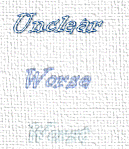I hope you find my writing and business tips and observations useful. My business and blog are dedicated to helping businesses communicate clearly and reach their potential.
Read, subscribe to my newsletter, enjoy!Tash
Agreeably in accord
Constantly confused by letters and similar sounding words? Then read on, learn new definitions and relax!
consonance [noun]: agreement or harmony of the parts of a whole; the repetition of consonants, usually for the key syllables of words or in key words of the writing – often used in poetry
Consonance of words, tone and meaning makes good writing better.
Click-clack, click-clack, the train runs along the track. {note the repeated ck sound)
consonants [noun ]: letters other than vowels ( so not a, e, i, o or u) – more technically, these are the letters which require at least partial closing your vocal tract to say them.
There are 21 consonants in the English language, although Y can act as a vowel and W acts as a vowel in Welsh.
consonant [adjective]: in harmony or agreement
Consonant with the company’s brand, the salesman promised quickly delivery
Is anything worse than doing your worst?
With only one letter difference, today’s words are related but subtly different – and just sound wrong when used in the wrong context. Thanks to Entrapment’s comment a week or so ago, here are my definitions of worse and worst.
Note that both of these words can be used as an adverb, adjective or noun (and worst can also be a verb) so I have given all definitions.
worse:
[adjective] of a lower quality or standard The sight was terrible, and the smell worse!
[noun] more unfavourable or desirable Worse was yet to come!
[adverb] showing less skill or ability She had worse handwriting than you!
worst:
[adjective] the lowest quality or standard The hotel last night had the worst service.
[noun] the most unfavourable or desirable He was yet to face the worst.
[adverb] the most adversely or severely Marytown was the worst affected in the fires.
[verb] completely or thoroughly defeat He came out of that the worst.
The key difference to remember is that worse is poor while worst is the poorest possible. For instance, the flu is worse than a cold but pneumonia is the worst of the three.
Just to twist things a little, do you often think about the worst parts of your business, or concentrate on the best?
Root, Rout, Route – which to take?
 This group of words will be more or less confusing depending on where you live; in Australia, root and route sound quite different so we get confused more by American TV and movies than in common speech.
This group of words will be more or less confusing depending on where you live; in Australia, root and route sound quite different so we get confused more by American TV and movies than in common speech.
Root [noun]: part of a plant that anchors it and sources nutrients for the plant; an anchoring structure or element such as the part of a hair under the skin and the underlying cause of an issue
Carrots and parsnips are both root vegetables.
It is the love of money, rather than money, that is the root of many problems.
Rout [noun]: an obvious defeat or unruly withdrawal of troops form a battle; a disorganised crowd, often rioting
The General was not sympathetic to his officers after the rout last week.
Route [noun]: a path or means of travel; a designated area or path for a salesperson or franchise; the means of entry (generally used in medical situations)
The cubs carefully planned their route with a compass and map.
Sneezing is a common route of transmission for the flu virus.
To tell root and rout apart, remember that a rout is about the soldiers getting out of a loosing battle.
Of course, I should also mention that there is another (not so family friendly) meaning of the word ‘root’ in Australia – while it may be slang, it is well known and has caused many a laugh when international visitors use the word unwisely!
Sometimes you have use some time
Sometime [adverb]: a not defined time, unspecified time
I’ll finish the great Australian novel sometime.
Sometimes [adverb]: occasionally, from time to time
Sometimes business owners think about going back to having a job.
Some time [phrase]: a period of time
For some time I have been planning to write another eBook.
This trio is based on the same two words merged into one, or not, and all relate to time so the differences are subtle enough it isn’t surprising some people misuse them.
Left as two words to be the phrase, ‘some time’ is the most precise and considered of the three – and it has more precision required to separate the two words so maybe that will help remember when to use the phrase rather than an adverb.
Do you allude or elude?
Another pair of words daily confused as people often don’t know the difference between allude and elude, or use them incorrectly anyway.
allude [verb]: indirectly refer to something
Being discreet, the Principal will only allude to the incident when explaining the new policy to students.
Note that allude is an indirect reference so does not fit in a sentence such as ‘In summary, the details I alluded to are numerous but simple’ because giving details is not indirect – mentioned or referred would be better words in this instance.
elude [verb]: to escape or get away from
The truant student continues to elude teachers and social workers.
The manager’s name eludes me but I remember his jolly laugh.
Remember the e in elude and escape to help get these words in their correct context.
How bizarre’s your bazaar?
While clearly pronounced differently, bizarre and bazaar are similar enough to cause confusion. Although it may simply be the spelling of each that confuses, rather than mixing the two up…
Bazaar [noun]: a marketplace with miscellaneous stalls and shops, especially in a Middle Eastern country; a shop or market selling a mixture of items; a stall or market where goods are sold as a fund-raising event
Mireille strolled through the bazaar while waiting for friends in Lebanon.
Bizarre [adjective]: odd, obviously out of the ordinary and different, far-fetched, unexpected
The teacher’s outfit was bizarre – a mix of cultures, colours and fabrics like I’d never seen before.
I’ll throw your throne
I spent a lot of time yesterday running around and throwing balls at kids (mostly during games of poison ball with Cub and Joey Scouts) so this pair of words came to mind for today’s Monday Meanings. It’s certainly a pair of words that would look very strange when used in the wrong way.
Throne [noun]: a seat reserved for use by a monarch; a large, ornate or imposing seat
Everyone stood as the Queen approached her throne.
A giant throne dominated the grass near the car park.
Thrown [verb – past participle of throw]: having propelled an object through the air, generally by an abrupt arm or hand movement; caused a fall; confused (common speech use)
The ball was thrown five times before Jack could catch it.
The cowboy was thrown from his horse when a snake crossed the path.
“I was thrown by the word buoy in that sentence,” she said.
If you need a way to tell these words apart, remember that a throne is for one special person.
Have you ever seen these two words misused?
Contemplate these meanings
Despite the similarity in spelling for today’s words, they have very different meanings.
contemn: [verb] scorn, disregard, feel contempt for
He seems to take price in his ability to contemn new performers.
contemplate: [verb] consider, envisage and observe consistently about a likely or probably action or outcome
A wise person will contemplate all options before making an important decision.
The word contemn is not used a lot, but some people question whether it was the intended word in line two of The Ode (part of For The Fallen by Laurence Binyon and used in ANZAC and other remembrance services around the world):
They shall grow not old, as we that are left grow old;
Age shall not weary them, nor the years condemn.
At the going down of the sun and in the morning
We will remember them.
It appears that Binyon did intend to use the word ‘condemn’, but ‘contemn’ would also fit in there. Which word gives the better message to you?
Is your presents required?
Unfortunately, I came across the following sentence online last week:
It is true that having an online presents is very important, however it is just as important to have a real life presents.
So today’s Monday Meaning is aimed at correcting that sentence, and preventing it ever being written again!
presents [noun]: something given to another; a gift
The pile of presents reached the branches of the Christmas tree.
presents [verb]: the act of handing over and introducing something or someone
The compere presents each nominee before the awards are announced.
presence [noun]: the existence or occurrence of someone or something in a particular place
The contract must be signed in the presence of two adult witnesses.
To remember which is which, think about the presents you have been sent.
Console foreign dignitaries…
Another pair of words that could lead to embarrassment if used in the wrong way…
consul: [noun] a State agent in a foreign place, usually to represent the state in that foreign place
I contacted the Australian Consul about voting when I was in Europe last year.
console: [verb] comfort and make someone feel better; [noun] control panel or switchboard of electrical equipment; [noun] cabinet or frame supporting equipment such as a TV or stereo
Family and friends gathered around the widow in an attempt to console her.
The sound technician pored over the console to find the error and restore sound.



Recent Comments